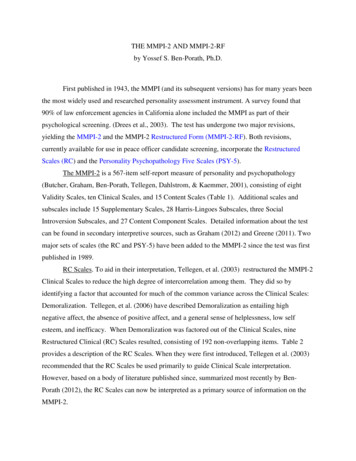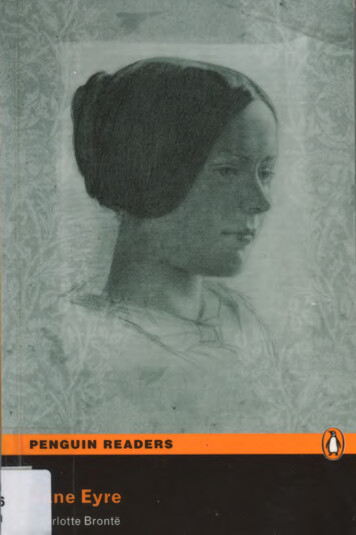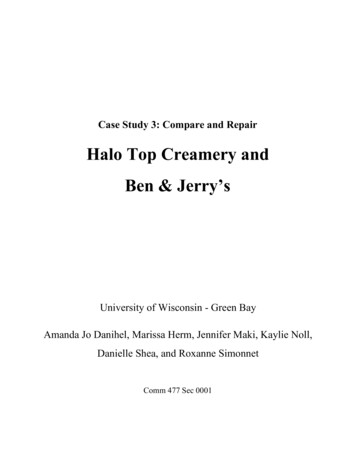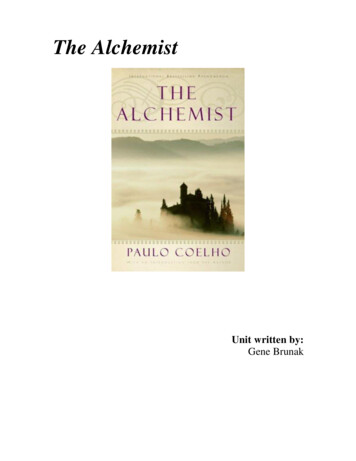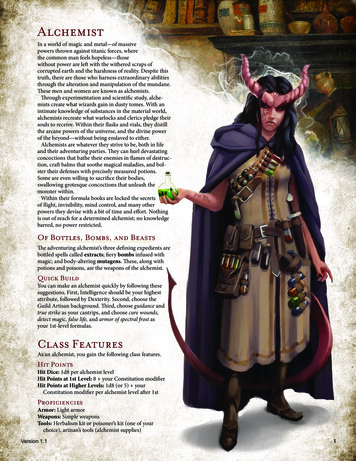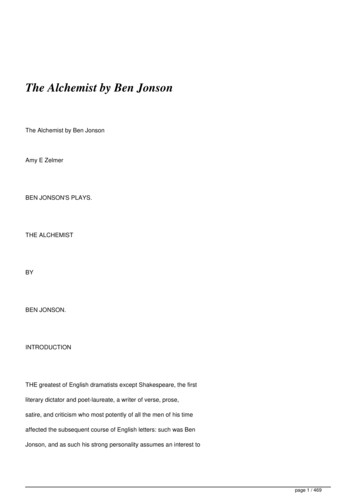
Transcription
The Alchemist by Ben JonsonThe Alchemist by Ben JonsonAmy E ZelmerBEN JONSON'S PLAYS.THE ALCHEMISTBYBEN JONSON.INTRODUCTIONTHE greatest of English dramatists except Shakespeare, the firstliterary dictator and poet-laureate, a writer of verse, prose,satire, and criticism who most potently of all the men of his timeaffected the subsequent course of English letters: such was BenJonson, and as such his strong personality assumes an interest topage 1 / 469
us almost unparalleled, at least in his age.Ben Jonson came of the stock that was centuries after to give tothe world Thomas Carlyle; for Jonson's grandfather was ofAnnandale, over the Solway, whence he migrated to England.Jonson's father lost his estate under Queen Mary, "having been castinto prison and forfeited." He entered the church, but died amonth before his illustrious son was born, leaving his widow andchild in poverty. Jonson's birthplace was Westminster, and thetime of his birth early in 1573. He was thus nearly ten yearsShakespeare's junior, and less well off, if a trifle better born.But Jonson did not profit even by this slight advantage. Hismother married beneath her, a wright or bricklayer, and Jonson wasfor a time apprenticed to the trade. As a youth he attracted theattention of the famous antiquary, William Camden, then usher atWestminster School, and there the poet laid the solid foundationsof his classical learning. Jonson always held Camden inveneration, acknowledging that to him he owed,"All that I am in arts, all that I know;"and dedicating his first dramatic success, "Every Man in HisHumour," to him. It is doubtful whether Jonson ever went to eitheruniversity, though Fuller says that he was "statutably admittedinto St. John's College, Cambridge." He tells us that he took nodegree, but was later "Master of Arts in both the universities, bypage 2 / 469
their favour, not his study." When a mere youth Jonson enlisted asa soldier, trailing his pike in Flanders in the protracted wars ofWilliam the Silent against the Spanish. Jonson was a large andraw-boned lad; he became by his own account in time exceedinglybulky. In chat with his friend William Drummond of Hawthornden,Jonson told how "in his service in the Low Countries he had, in theface of both the camps, killed an enemy, and taken opima spoliafrom him;" and how "since his coming to England, being appealed tothe fields, he had killed his adversary which had hurt him in thearm and whose sword was ten inches longer than his." Jonson'sreach may have made up for the lack of his sword; certainly hisprowess lost nothing in the telling. Obviously Jonson was brave,combative, and not averse to talking of himself and his doings.In 1592, Jonson returned from abroad penniless. Soon after hemarried, almost as early and quite as imprudently as Shakespeare.He told Drummond curtly that "his wife was a shrew, yet honest";for some years he lived apart from her in the household of LordAlbany. Yet two touching epitaphs among Jonson's "Epigrams," "Onmy first daughter," and "On my first son," attest the warmth of thepoet's family affections. The daughter died in infancy, the son ofthe plague; another son grew up to manhood little credit to hisfather whom he survived. We know nothing beyond this of Jonson'sdomestic life.How soon Jonson drifted into what we now call grandly "thetheatrical profession" we do not know. In 1593, Marlowe made hispage 3 / 469
tragic exit from life, and Greene, Shakespeare's other rival on thepopular stage, had preceded Marlowe in an equally miserable deaththe year before. Shakespeare already had the running to himself.Jonson appears first in the employment of Philip Henslowe, theexploiter of several troupes of players, manager, and father-in-lawof the famous actor, Edward Alleyn. From entries in "Henslowe'sDiary," a species of theatrical account book which has been handeddown to us, we know that Jonson was connected with the Admiral'smen; for he borrowed 4 pounds of Henslowe, July 28, 1597, payingback 3s. 9d. on the same day on account of his "share" (in what isnot altogether clear); while later, on December 3, of the sameyear, Henslowe advanced 20s. to him "upon a book which he showedthe plot unto the company which he promised to deliver unto thecompany at Christmas next." In the next August Jonson was incollaboration with Chettle and Porter in a play called "Hot AngerSoon Cold." All this points to an association with Henslowe ofsome duration, as no mere tyro would be thus paid in advance uponmere promise. From allusions in Dekker's play, "Satiromastix," itappears that Jonson, like Shakespeare, began life as an actor, andthat he "ambled in a leather pitch by a play-wagon" taking at onetime the part of Hieronimo in Kyd's famous play, "The SpanishTragedy." By the beginning of 1598, Jonson, though still in needycircumstances, had begun to receive recognition. Francis Meres -well known for his "Comparative Discourse of our English Poets withthe Greek, Latin, and Italian Poets," printed in 1598, and for hismention therein of a dozen plays of Shakespeare by title -- accordsto Ben Jonson a place as one of "our best in tragedy," a matter ofsome surprise, as no known tragedy of Jonson from so early a datepage 4 / 469
has come down to us. That Jonson was at work on tragedy, however,is proved by the entries in Henslowe of at least three tragedies,now lost, in which he had a hand. These are "Page of Plymouth,""King Robert II. of Scotland," and "Richard Crookback." But all ofthese came later, on his return to Henslowe, and range from August1599 to June 1602.Returning to the autumn of 1598, an event now happened to sever fora time Jonson's relations with Henslowe. In a letter to Alleyn,dated September 26 of that year, Henslowe writes: "I have lost oneof my company that hurteth me greatly; that is Gabriel [Spencer],for he is slain in Hogsden fields by the hands of Benjamin Jonson,bricklayer." The last word is perhaps Henslowe's thrust at Jonsonin his displeasure rather than a designation of his actualcontinuance at his trade up to this time. It is fair to Jonson toremark however, that his adversary appears to have been a notoriousfire-eater who had shortly before killed one Feeke in a similarsquabble. Duelling was a frequent occurrence of the time amonggentlemen and the nobility; it was an impudent breach of the peaceon the part of a player. This duel is the one which Jonsondescribed years after to Drummond, and for it Jonson was dulyarraigned at Old Bailey, tried, and convicted. He was sent toprison and such goods and chattels as he had "were forfeited." Itis a thought to give one pause that, but for the ancient lawpermitting convicted felons to plead, as it was called, the benefitof clergy, Jonson might have been hanged for this deed. Thecircumstance that the poet could read and write saved him; and hepage 5 / 469
received only a brand of the letter "T," for Tyburn, on his leftthumb. While in jail Jonson became a Roman Catholic; but hereturned to the faith of the Church of England a dozen years later.On his release, in disgrace with Henslowe and his formerassociates, Jonson offered his services as a playwright toHenslowe's rivals, the Lord Chamberlain's company, in whichShakespeare was a prominent shareholder. A tradition of longstanding, though not susceptible of proof in a court of law,narrates that Jonson had submitted the manuscript of "Every Man inHis Humour" to the Chamberlain's men and had received from thecompany a refusal; that Shakespeare called him back, read the playhimself, and at once accepted it. Whether this story is true ornot, certain it is that "Every Man in His Humour" was accepted byShakespeare's company and acted for the first time in 1598, withShakespeare taking a part. The evidence of this is contained inthe list of actors prefixed to the comedy in the folio of Jonson'sworks, 1616. But it is a mistake to infer, because Shakespeare'sname stands first in the list of actors and the elder Kno'wellfirst in the dramatis personae, that Shakespeare took thatparticular part. The order of a list of Elizabethan players wasgenerally that of their importance or priority as shareholders inthe company and seldom if ever corresponded to the list ofcharacters."Every Man in His Humour" was an immediate success, and with itJonson's reputation as one of the leading dramatists of his timepage 6 / 469
was established once and for all. This could have been by no meansJonson's earliest comedy, and we have just learned that he wasalready reputed one of "our best in tragedy." Indeed, one ofJonson's extant comedies, "The Case is Altered," but one neverclaimed by him or published as his, must certainly have preceded"Every Man in His Humour" on the stage. The former play may bedescribed as a comedy modelled on the Latin plays of Plautus. (Itcombines, in fact, situations derived from the "Captivi" and the"Aulularia" of that dramatist). But the pretty story of thebeggar-maiden, Rachel, and her suitors, Jonson found, not among theclassics, but in the ideals of romantic love which Shakespeare hadalready popularised on the stage. Jonson never again produced sofresh and lovable a feminine personage as Rachel, although in otherrespects "The Case is Altered" is not a conspicuous play, and, savefor the satirising of Antony Munday in the person of AntonioBalladino and Gabriel Harvey as well, is perhaps the leastcharacteristic of the comedies of Jonson."Every Man in His Humour," probably first acted late in the summerof 1598 and at the Curtain, is commonly regarded as an epoch-makingplay; and this view is not unjustified. As to plot, it tellslittle more than how an intercepted letter enabled a father tofollow his supposedly studious son to London, and there observe hislife with the gallants of the time. The real quality of thiscomedy is in its personages and in the theory upon which they areconceived. Ben Jonson had theories about poetry and the drama, andhe was neither chary in talking of them nor in experimenting withpage 7 / 469
them in his plays. This makes Jonson, like Dryden in his time, andWordsworth much later, an author to reckon with; particularly whenwe remember that many of Jonson's notions came for a timedefinitely to prevail and to modify the whole trend of Englishpoetry. First of all Jonson was a classicist, that is, he believedin restraint and precedent in art in opposition to the prevalentungoverned and irresponsible Renaissance spirit. Jonson believedthat there was a professional way of doing things which might bereached by a study of the best examples, and he found theseexamples for the most part among the ancients. To confine ourattention to the drama, Jonson objected to the amateurishness andhaphazard nature of many contemporary plays, and set himself to dosomething different; and the first and most striking thing that heevolved was his conception and practice of the comedy of humours.As Jonson has been much misrepresented in this matter, let us quotehis own words as to "humour." A humour, according to Jonson, was abias of disposition, a warp, so to speak, in character by which"Some one peculiar qualityDoth so possess a man, that it doth drawAll his affects, his spirits, and his powers,In their confluctions, all to run one way."But continuing, Jonson is careful to add:page 8 / 469
"But that a rook by wearing a pied feather,The cable hat-band, or the three-piled ruff,A yard of shoe-tie, or the Switzers knotOn his French garters, should affect a humour!O, it is more than most ridiculous."Jonson's comedy of humours, in a word, conceived of stagepersonages on the basis of a ruling trait or passion (a notablesimplification of actual life be it observed in passing); and,placing these typified traits in juxtaposition in their conflictand contrast, struck the spark of comedy. Downright, as his nameindicates, is "a plain squire"; Bobadill's humour is that of thebraggart who is incidentally, and with delightfully comic effect, acoward; Brainworm's humour is the finding out of things to the endof fooling everybody: of course he is fooled in the end himself.But it was not Jonson's theories alone that made the success of"Every Man in His Humour." The play is admirably written and eachcharacter is vividly conceived, and with a firm touch based onobservation of the men of the London of the day. Jonson wasneither in this, his first great comedy (nor in any other play thathe wrote), a supine classicist, urging that English drama return toa slavish adherence to classical conditions. He says as to thelaws of the old comedy (meaning by "laws," such matters as theunities of time and place and the use of chorus): "I see not then,but we should enjoy the same licence, or free power to illustrateand heighten our invention as they [the ancients] did; and not betied to those strict and regular forms which the niceness of a few,page 9 / 469
who are nothing but form, would thrust upon us." "Every Man in HisHumour" is written in prose, a novel practice which Jonson had ofhis predecessor in comedy, John Lyly. Even the word "humour" seemsto have been employed in the Jonsonian sense by Chapman beforeJonson's use of it. Indeed, the comedy of humours itself is only aheightened variety of the comedy of manners which represents life,viewed at a satirical angle, and is the oldest and most persistentspecies of comedy in the language. None the less, Jonson's comedymerited its immediate success and marked out a definite course inwhich comedy long continued to run. To mention only Shakespeare'sFalstaff and his rout, Bardolph, Pistol, Dame Quickly, and therest, whether in "Henry IV." or in "The Merry Wives of Windsor,"all are conceived in the spirit of humours. So are the captains,Welsh, Scotch, and Irish of "Henry V.," and Malvolio especiallylater; though Shakespeare never employed the method of humours foran important personage. It was not Jonson's fault that many of hissuccessors did precisely the thing that he
THE ALCHEMIST BY BEN JONSON. INTRODUCTION THE greatest of English dramatists except Shakespeare, the first literary dictator and poet-laureate, a writer of verse





